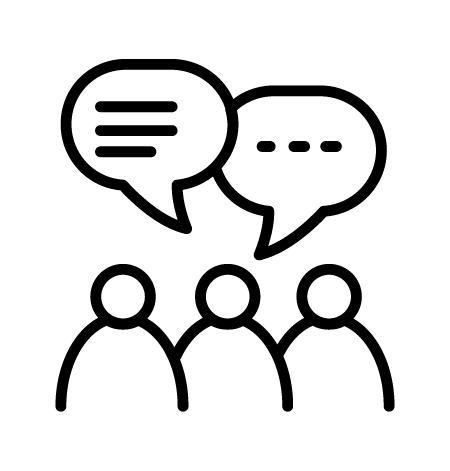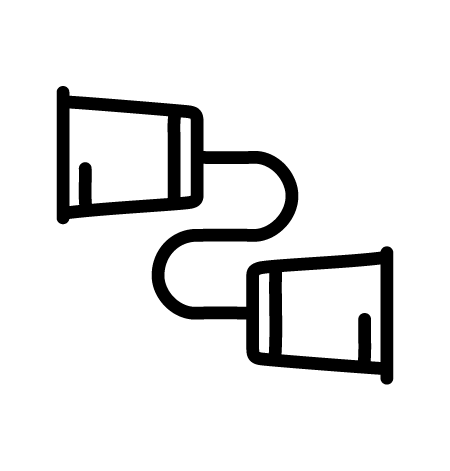Talking with Youth
Nau mai ki te korero — welcome to the conversation
He mea uaua ki te korero, engari he mea whakahirahira (its hard to talk about – but important)
—Anon young person, TLP ITK survey
Here’s some simple tips for talking to your teen about porn including:
preparing for the conversation, conversation openers, topics to talk about,
helpful resources and keeping the lines open.
Before you talk …
Prepare to be
un-shockable
The chances are pretty high that the teen you are talking to has seen porn. Try not to act surprised about what they tell you, particularly if they talk about the type of porn they’ve seen. This isn’t the time for shame and blame, so avoid words like bad or wrong and take a curious, open, non-judgemental approach.
Good rapport
Porn is a tough topic to bring up so make sure you have a good rapport with the young person you’re speaking with and that they feel safe with you.
Choose the right time, place and environment
Talking while doing an activity can work well as it can be less intense or confrontational. Some teens prefer to chat one to one, while others may like to talk in a group. Talking about porn with friends can be quite acceptable amongst some teens and doesn’t have the same stigma it does for most adults.
 THINGS TO CONSIDER
THINGS TO CONSIDER
Some young people may have had negative experiences with porn and want to talk about this, but they’re too embarrassed to raise it on their own. It’s great to be aware of some of the common porn related issues that teens can face as you go into the conversation.
These can Include ...
- Feeling their porn use is out of control.
- Seeking increasingly violent porn themes – and feeling uncomfortable with it, but unable to stop.
- Feeling pressure to do something sexually that a partner has seen in porn, but not wanting to.
- Having sent images of themselves around and regretting it, but feeling too afraid to tell an adult.
- Experiencing pressure to send nude photos.
- Revenge porn (someone distributing nudes without consent); note: teens in the LGBTQI+ community are at increased risk of having experienced revenge porn/image-based abuse.
- Feeling pressure to watch porn by friends or a partner.
- Feeling upset, anxious or traumatised by images in porn, especially when there’s a history of sexual abuse.
If you are interested in learning more about some of the issues young people are wanting help with around porn, check out our latest youth site IN THE KNOW with tips, tools and info on the tricky porn related stuff.

A note on shame
Surveys with young kiwis have shown that a lot of young people feel uncomfortable about their experiences with porn. They might know some of the porn they watch is violent, but also feel aroused by seeing nude bodies. This can result in them feeling shameful about their porn use and make it extra hard to talk to adults about it. Normalising young people’s experiences with porn can really help this “Its okay to feel lots of things when you watch porn.. curious, grossed out and aroused – that’s normal.”
Some Conversation openers …
Ask open questions (ones that start with what, how and why) that get their perspective on porn and listen with empathy.
Here’s some opening lines to get underway …
“I heard that most young people are learning about sex through porn now, what do you think?”
“Are your friends talking about or watching porn? What do you think about porn?”
“I heard about research suggesting that watching porn can affect your sex life. What do you think?”
Conversation Ideas …
Once you’ve got the conversation started, you can start helping a teen to develop their porn literacy. This means helping them learn to analyse and identify some of the messaging in porn (like whether its sexist or racist) and to critically examine how porn messaging relates to real life sex in terms of consent, respect, safety, health and pleasure.
Here are a few questions you could ask …
What’s the difference between porn sex and good real-life sex?
Good sex always includes consent, respect, connection and pleasure for both partners. Porn sex by comparison contains a lot of sexual aggression, there’s very little focus on mutual pleasure, males frequently dominate females (or one partner ‘dominates’ another in some gay porn) and there’s often a lack of consent. Porn might show young people sex, body parts and what goes where – but it doesn’t teach them how to have respectful, meaningful and healthy sex in the real world.
“What kind of sex is porn teaching us?”
Porn and body image – are porn bodies real?
Most porn uses professional actors, many of whom have surgically altered bodies or use performance enhancing stimulants such as Viagra. This can be hard for young people watching porn as it can cause unrealistic sexual expectations. Teens can start to feel pressure to ‘perform’ sexually or look like porn stars, which can cause body image and self-esteem issues.
“Is porn realistic?”
What’s the impact of porn in the bedroom?
From our experience, this one seems to get young people’s attention! Frequent porn use can really start to impact young people’s sex lives – for the worse. Males who watch porn regularly are more likely to be coercive (pressuring a partner to do something they don’t want to) and sexually aggressive with their partners. They can find it hard to get turned on without porn, are more likely to have problems maintaining erections, and can end up preferring porn to real partners. Porn can also make young people develop unrealistic sexual expectations, so real-life sex isn’t as pleasurable.
“Look after your sex drive, you’ll need it in the future.”
Helpful conversation resources
Here are some links to youth resources to help keep the conversation going. These include youth-friendly information on how watching porn and the messages in porn can affect their sex life, mental health and relationships:
Porn: The Facts for Youth
What Really is Sexy?
Getting Real:
Great Sex vs
Porn Sex
intheknow.co.nz
Can porn affect us?
Keeping the lines open
As you finish up the conversation, make sure you’re both on the same team …

Get their ideas
Ask how you can keep the conversation going. See what’s best for them – it could be face to face conversations or through texts or emails.

Peer Pressure
Thank them for being honest and surviving an awkward conversation! Remind them at the end of the day you’re on their side and you want to help them to have a great understanding of what healthy sex looks like.

Help
If the teen has indicated a need for help, check out Need Help? and offer some support or referral options so they know they’ve been heard and there’s some hope.

Keep the conversation open
Keep the lines open
As you finish up the conversation …

Peer Pressure

Ask for their ideas

Keep the conversation open

Offer them help

Thank them



